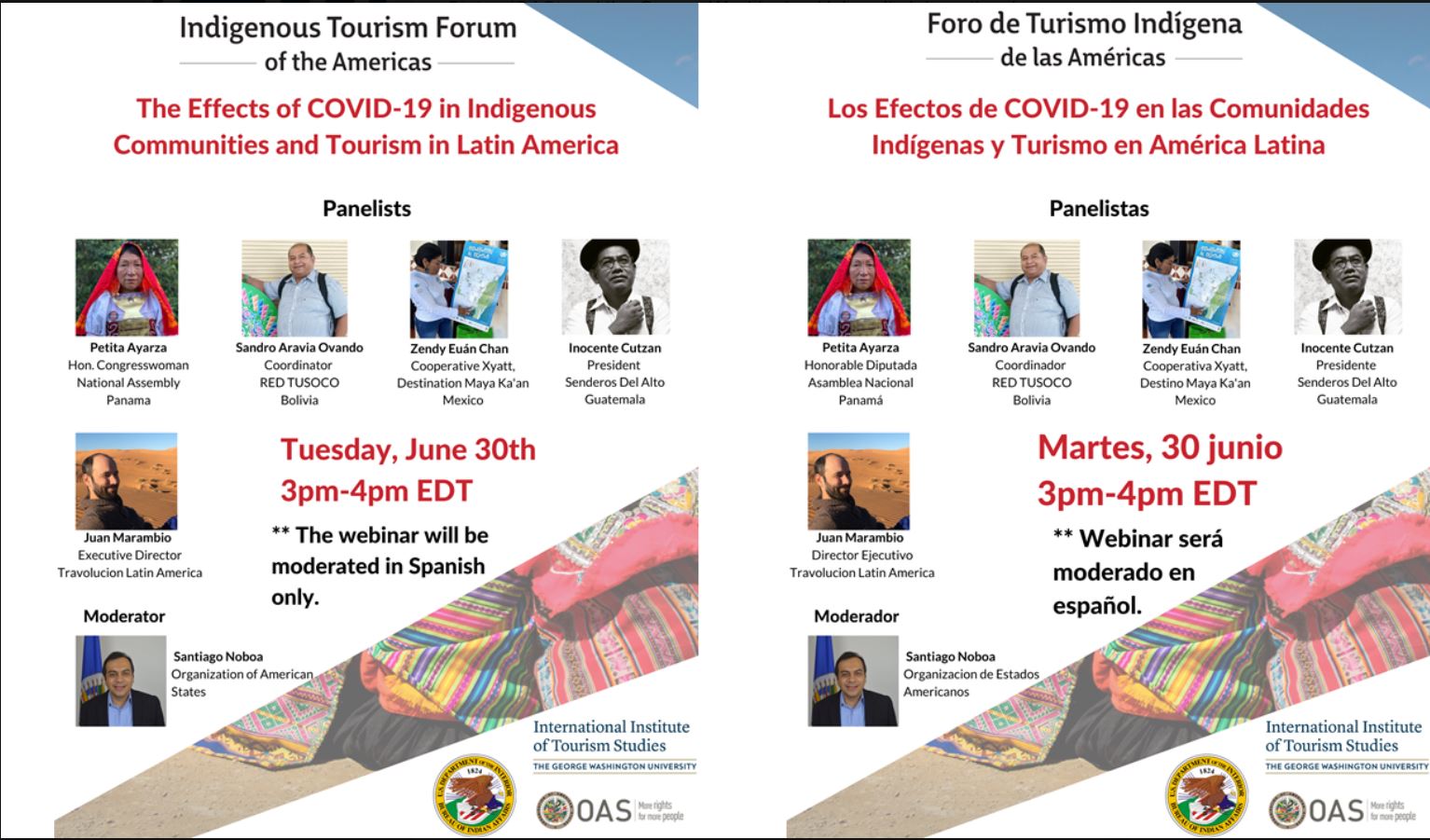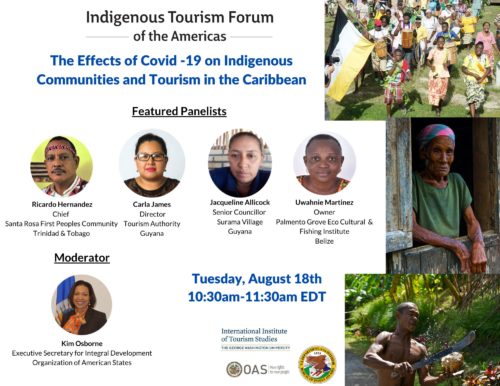The Effects of COVID-19 on Indigenous Communities and Tourism Webinar Recordings
COVID-19 Resources
1. Organization of American States’ COVID-19 Tourism Policy Responses
2.Organization of American States’ Guía Práctica de Respuestas Inclusivas y con Enfoque de Derechos ante el COVID-19 en las Américas
3. Indigenous Tourism Association of Canada’s COVID-19 Stimulus Solutions
4. Indigenous Tourism Association of Canada’s COVID-19 Information for Indigenous Tourism Businesses in Canada
5. United Nations World Tourism Organization’s COVID-19 Inclusive Response for Vulnerable Groups
6. Statement by Chief Ricardo Bharath Hernandez, Santa Rosa First Peoples Community, Arima, Trinidad and Tobago – The Pandemic: Indigenous Perspectives on Survival, Adaptation, Rebuilding and Preparedness
General Indigenous Tourism Resources
1. UNWTO Recommendations on Sustainable Development of Indigenous Tourism
In August 2019, the United Nations World Tourism Organization’s World Committee on Tourism Ethics proposed a set of Recommendations on Sustainable Development of Indigenous Tourism. These recommendations offer considerations on the potential benefits of tourism in Indigenous communities as well as guidelines for engagement in these communities to ensure distribution of benefits and contribution to Indigenous community empowerment among other issues. Submit examples of good practice of cultural tourism involving Indigenous peoples here to potentially be included as a case study in this document.
2. Organization of American States American Declaration on the Rights of Indigenous Peoples
Adopted in June 2016, the Declaration on the Rights of Indigenous Peoples guides engagement with Indigenous Peoples throughout the Organization of American States’ 32 member countries.
3. Organization of American States Proposed Guidelines for Community-Based Rural Tourism in the Americas (in Spanish)
This document provides an overview of the structure, focus, benefits, and characteristics of Community-Based Rural Tourism in countries throughout the Americas. It is a developing work that will be refined according to the CITUR Work Plan for 2018 – 2021.
4. Ministry of Foreign Trade and Tourism Peru Guidelines for the Development of Community-Based Tourism in Peru
Guidelines for how Peru will continue its development of community-based tourism as well as a detail of the process the Ministry went through to ensure there was collective and representative input on the final version.
5. Indigenous Tourism Association of Canada National Guidelines: Developing Authentic Indigenous Experiences in Canada
The Indigenous Tourism Association of Canada has developed comprehensive guidelines to assist Indigenous enterprises with launching tourism experiences. The guidelines discuss authenticity, visitor readiness, and market readiness and provide a self-assessment for readiness among other topics.
6. Compete Caribbean Community-Based Tourism Toolkit
Compete Caribbean developed a toolkit useful for potential tour operators considering developing community-based tourism experiences or any product that relies on community engagement. Discussions range from quality assurance to determining market readiness.
7. Intrepid Travel Reconciliation Action Plan
Intrepid Travel, the platinum sponsor of the inaugural Indigenous Tourism Forum of the Americas, has introduced the company’s first Reconciliation Action Plan, formalizing its commitment to using its business to close the gap between First Nations people and non-Indigenous Australians, where the company is headquartered. The plan is an example of how tourism businesses can increase their support for First Nations businesses, enhance indigenous leadership through innovative partnerships and employment opportunities, and continue building cultural awareness and understanding among staff and travelers.
8. G Adventures and the International Institute of Tourism Studies at George Washington University Indigenous People and the Travel Industry: Global Good Practice
G Adventures and the International Institute of Tourism Studies at George Washington University developed key guidelines around Indigenous tourism to provide a framework for good business practices. These are not standards but are meant to inform good, responsible, culturally sensitive business behaviors. They are meant to be scaled and adapted to fit local conditions and adjusted over time.


